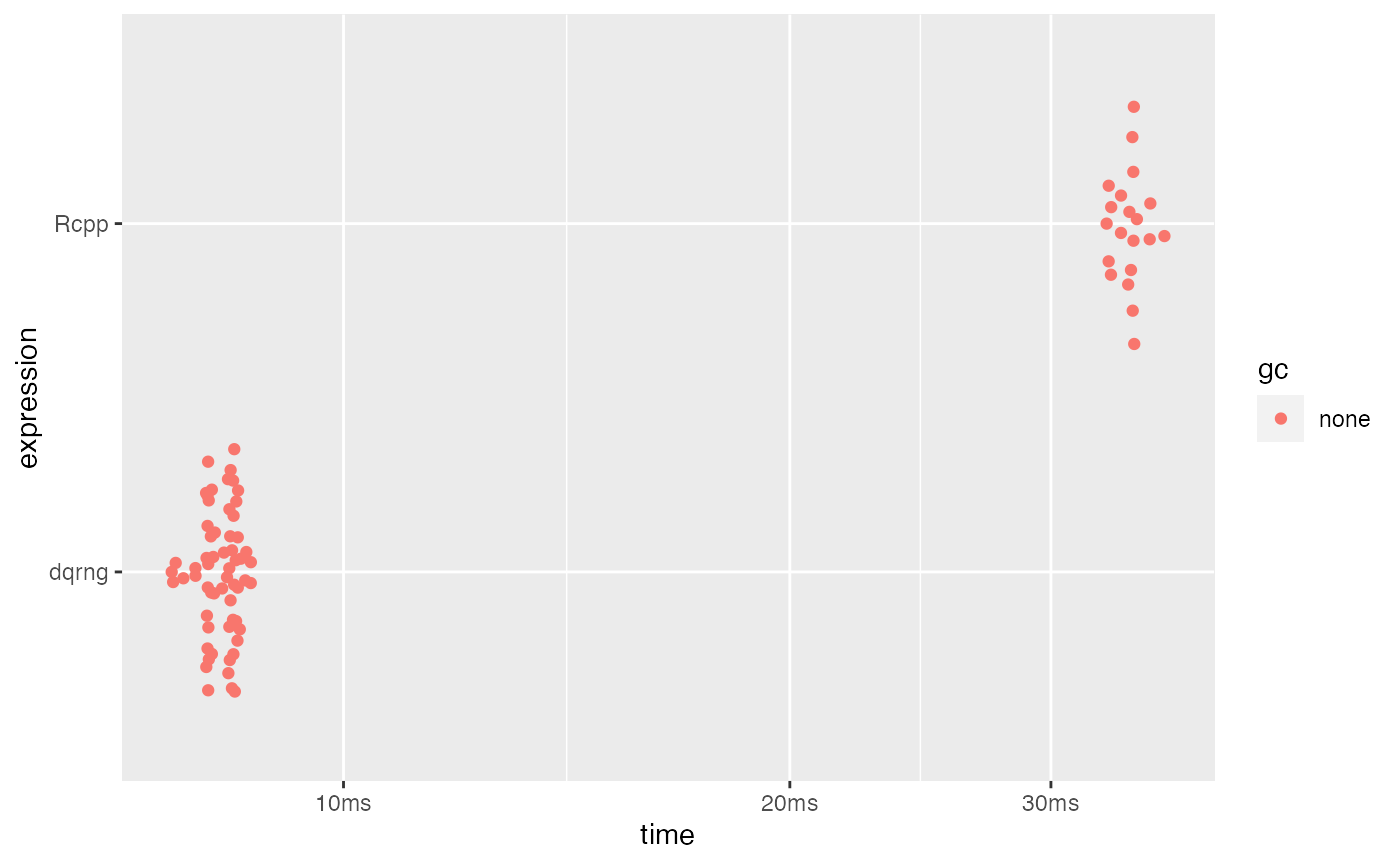Create new generators
create-new-generators.RmdSummary
This document describes how you can extend RcppRNG with your own generator classes for random numbers.
As an example, we will create an implementation of a generator for the Erlang distribution, see https://en.wikipedia.org/wiki/Erlang_distribution. Let \(k \in \mathbb{N}\) and \(\lambda > 0\). The \(\mathrm{Erlang}{(k, \lambda)}\) distribution has the stochastic representation \[ \sum_{j=1}^{k} E_j , \] where \(E_1, \ldots, E_k\) are iid exponentially distributed with rate \(\lambda\).
Setup
First, you have to tell Rcpp that you are using c++11 and that your code links to the packages RcppRNG (for obvious reasons) as well as dqrng, BH, and sitmo (to use the RNG from dqrng).
Implementation
The distribution
namespace RcppRNG {
namespace distribution {
namespace erlang {
template <typename _IntType, typename _RealType>
void check_params(const _IntType shape, const _RealType lambda) {
if (!(0 < shape)) throw std::range_error("shape not > 0");
if (!(0. <= lambda && lambda <= std::numeric_limits<_RealType>::infinity()))
throw std::range_error("lambda not in [0, infty]");
}
} // namespace erlang
template <typename _IntType, typename _RealType,
typename _ExponentialDistributionType>
class erlang_distribution {
public:
using result_type = _RealType;
static_assert(std::is_integral<_IntType>::value,
"_IntType not integral type");
static_assert(std::is_floating_point<_RealType>::value,
"_RealType not floating point number");
static_assert(std::numeric_limits<_RealType>::is_iec559,
"_RealType not IEEE 754");
class param_type {
public:
explicit param_type(const _IntType shape = _IntType{1},
const _RealType lambda = _RealType{1.})
: shape_{shape}, lambda_{lambda} {
erlang::check_params(shape_, lambda_);
}
// Used for construction from a different specialization
template <typename _ErlangParamType,
class = typename std::enable_if<
!std::is_convertible<_ErlangParamType, param_type>::value>>
explicit param_type(const _ErlangParamType& params)
: shape_{params.shape()}, lambda_{params.lambda()} {}
// compiler generated ctor and assignment op is sufficient
_IntType shape() const { return shape_; }
_RealType lambda() const { return lambda_; }
private:
_IntType shape_;
_RealType lambda_;
};
explicit erlang_distribution(const _IntType shape = _IntType{1},
const _RealType lambda = _RealType{1.})
: shape_{shape}, exponential_distribution_{lambda} {
erlang::check_params(shape_, exponential_distribution_.lambda());
}
explicit erlang_distribution(const param_type& params)
: shape_{params.shape()}, exponential_distribution_{params.lambda()} {}
// compiler generated ctor and assignment op is sufficient
param_type params() const {
return param_type{shape_, exponential_distribution_.lambda()};
}
void params(const param_type& params) {
shape_ = params.shape();
exponential_distribution_.params(params.lambda());
}
_IntType shape() const { return shape_; }
_RealType lambda() const { return exponential_distribution_.lambda(); }
template <typename _EngineType>
result_type operator()(_EngineType&& engine) {
result_type out = _RealType{0.};
for (_IntType j = _IntType(1); j <= shape_; ++j)
out += exponential_distribution_(std::forward<_EngineType>(engine));
return out;
}
template <typename _EngineType>
result_type operator()(_EngineType&& engine, const param_type& params) {
return typename param_type::distribution_type{params}(
std::forward<_EngineType>(engine));
}
private:
_IntType shape_;
_ExponentialDistributionType exponential_distribution_;
}; // erlang_distribution
} // namespace distribution
template <typename _IntType, typename _RealType,
typename _ExponentialDistributionType>
using erlang_distribution =
distribution::erlang_distribution<_IntType, _RealType,
_ExponentialDistributionType>;
} // namespace RcppRNG
Rcpp-wrapper
using namespace Rcpp;
using unit_exponential_distribution =
RcppRNG::unit_exponential_distribution<double>;
using exponential_distribution =
RcppRNG::exponential_distribution<double, unit_exponential_distribution>;
using erlang_distribution =
RcppRNG::erlang_distribution<int, double, exponential_distribution>;
//' @export
// [[Rcpp::export(rng=false)]]
NumericVector Rcpp_rerlang_RcppRNG(R_xlen_t n, int shape = 1, double rate = 1.) {
NumericVector out{no_init(n)};
RcppRNG::rng::RcppRNG engine{};
erlang_distribution erlang{shape, rate};
std::generate(out.begin(), out.end(),
[&engine, &erlang]() { return erlang(engine); });
return out;
}
//' @export
// [[Rcpp::export(rng=false)]]
NumericVector Rcpp_rerlang_DQRNG(R_xlen_t n, int shape = 1, double rate = 1.) {
NumericVector out{no_init(n)};
RcppRNG::rng::DQRNG engine{};
erlang_distribution erlang{shape, rate};
std::generate(out.begin(), out.end(),
[&engine, &erlang]() { return erlang(engine); });
return out;
}Test
set.seed(1623L) Rcpp_rerlang_RcppRNG(10, 3, 0.5) #> [1] 10.502098 7.088853 5.084991 7.435394 2.082935 7.849784 5.739142 #> [8] 9.858097 8.521792 6.443745 RcppRNG::dqset_seed(1623L) Rcpp_rerlang_DQRNG(10, 3, 0.5) #> [1] 3.401419 5.063018 4.915893 11.271596 14.128176 7.942866 8.195575 #> [8] 2.825962 12.446754 3.054656
